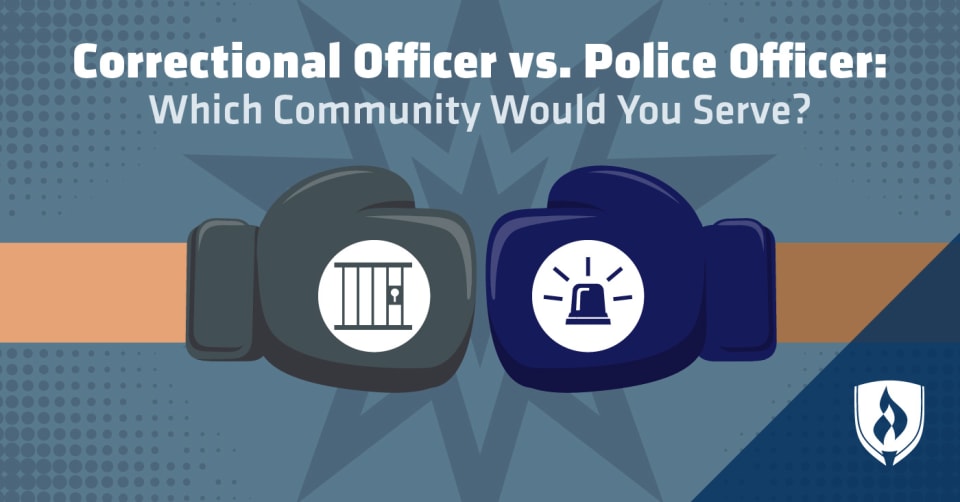Correctional Officer vs. Police Officer: Which Role Is Right for You?
By Brianna Flavin on 03/16/2020

Careers in criminal justice and law enforcement are often considered some of the most challenging positions a person could take on. Maybe that’s a good thing—because at the end of the day, the ideal candidate for these roles is someone who is truly passionate about their community.
The world of law enforcement is pretty complex when you start looking into it. There are many kinds of police officers out there, for example, and if you don’t have a military background, it can be confusing to understand the system of police ranks.
When comparing the role of a correctional officer versus police officer, however, you can rely on a few really big differences. And if you’ve ever thought about working in law enforcement, those differences can help you decide which one is a better direction for the kind of job you need.
Keep reading to see what differentiates these two law enforcement careers.
Correctional officer vs. police officer: The job description
One obvious place to turn when trying to compare these roles is to take a closer look at the duties found in their job descriptions. Correctional officers oversee individuals who’ve been arrested and are awaiting trial or who are serving time in jail or prison, according to the Bureau of Labor Statistics (BLS).1
If you work in this role—these individuals are the community you are responsible to protect. Correctional officer duties usually involve enforcing institution rules, inspecting facilities, overseeing and documenting inmate conduct, and escorting or transporting inmates.
These officers need to be hyper aware of security precautions and protocol—ready to prevent violence, spot unsafe facility conditions, and ready to intervene in crisis situations or escapes. Correctional officers also inspect inmates’ cells, their mail and their visitors for prohibited items.
Police officers have a substantially different role, according to the BLS. Instead of focusing on the behavior of people in the confine of a correctional facility, they patrol areas, inspect vehicles and crime scenes. Their typical duties include conducting traffic stops, responding to emergency and non-emergency calls, writing detailed reports and preparing cases to testify in court. They appear in almost every kind of community throughout the country.
But there are so many different kinds of police officers that this hardly scratches the surface. Their location, specialties and titles make a huge difference in what various police officers do. To get an idea of the types of officers out there, check out our article, “Behind the Badge: Examining 10 Types of Police Officers.”
Correctional officer vs police officer: Work environment
As you’d assume from the job description, correctional officers work in jails, prisons and other correctional institutions. According to the BLS, correctional officers and jailers have one of the highest rates of injuries and illnesses of all occupations.1 Since these facilities need to be fully-staffed at all times, officers work in shifts to cover all hours of the year.
Police officers work in pretty much every other kind of location that falls within their agency’s territorial jurisdiction. State patrol officers will likely spend most of their time in a vehicle responding to roadside incidents and enforcing traffic laws. Municipal police might split their time between vehicles, their precinct and really any other place they are responsible for monitoring. The BLS reports that police work can be physically demanding as well as psychologically challenging.1 But they also note that police officers have fairly low turnover rates and that many officers feel satisfied to be doing something for their community.
Correctional officer vs police officer: Skills needed
So what do you need to be effective in these roles? One way to determine that is to take a look at the specific skills employers want from job applicants for these roles. We analyzed over 5,000 correctional officer job postings and over 20,000 police officer job postings from the last year to find five top skills employers were seeking.
Specialized skills for correctional officers:2
- Public health and safety
- Cardiopulmonary Resuscitation (CPR)
- Surveillance
- Psychology
- Crisis intervention
Specialized skills for police officers:3
- Prevention of criminal activity
- Public health and safety
- Witness interviews
- Crowd control
- Cardiopulmonary Resuscitation (CPR)
Both types of officers also need soft skills like communication, writing and computer literacy—as well as the physical ability to maintain control in a situation. Both police officers and corrections officers can routinely encounter unpleasant scenes and work closely with people in intense suffering, so mental toughness and the ability to manage stress in a healthy way is important. For more ideas on what an officer needs to excel, check out our article, “6 Often Overlooked Qualities of a Great Police Officer.”
Correctional officer vs police officer: Career outlook
Another factor you’ll want to consider when comparing is the overall salary and job outlook for these positions. Committing to one of these careers paths is a big step, so it only makes sense to research the job market.
From 2018 to 2028, the BLS projects a 7 percent decline in employment of correctional officers due to state and local budget constraints, the high cost of keeping people in prison and state laws endeavoring to prioritize more economic alternatives to prison where possible.1 Despite this, the BLS writes that “… job prospects should still be good due to the need to replace correctional officers who retire, transfer to other occupations or leave the labor force.”1
Police and detective employment is projected to grow 5 percent from 2018 to 2028, which is on par with the average projected rate of growth for all occupations.1 Employment in this industry is so heavily determined by location, state and local budgets that some areas might experience huge growth while others see diminished opportunity. The BLS notes that police officers have relatively low rates of turnover and that new applicants with a bachelor’s degree, prior experience, or who speak more than one language should find the most job opportunity.1
Correctional officer vs police officer: Education and training needed
Another big factor to weigh is the amount of education and training you’ll need in order to land one of these roles—and there’s a significant difference to be found in this comparison.
Correctional officers typically have a lower barrier to entry—usually they’ll just need to attend a training academy, according to the BLS.1 All states require at least a high school diploma for this role, though some states may also ask for more—like a background in Criminal Justice education. The BLS states that corrections officers who want to work in federal prisons will likely need a bachelor’s degree or 1 to 3 years of full-time experience in a field involving counseling, assistance or supervision.
For police officers, education requirements are a bit more varied. All agencies require at least a high school diploma and many ask for a college degree or completion of a certain number of college courses. The BLS notes that after these requirements are met, applicants must graduate from a state-approved training academy—like the Rasmussen College Law Enforcement program in the state of Minnesota.
Both of these careers require applicants to pass a background check and meet certain age and physical standards—which will vary according to the position and employer.
The law enforcement career you’ve been looking for
Now that you know more about what a correctional officer vs. police officer career is like—you can decide if either of these choices sounds like a role you could thrive in. Working in law enforcement is definitely not for everyone, but if you think you’ve got what it takes to safely serve your community, both corrections and police work can be viable career options.
If you are most interested in becoming a correctional officer, you may want to get started with an Associate’s degree in Criminal Justice.4
If you are thinking a police officer career seems more appealing, check out the Rasmussen College Law Enforcement programs offered in Minnesota.
Related Articles:
1Bureau of Labor Statistics, U.S. Department of Labor, Occupational Outlook Handbook, [career information accessed February, 2020]. Data represents national, averaged earnings for the occupations listed and includes workers at all levels of education and experience. Employment conditions in your area may vary.
2Burning-Glass.com (analysis of 5,393 correctional officer job postings, February 1, 2019 – January 31, 2020)
3Burning-Glass.com (analysis of 24,123 police officer job postings, February 1, 2019 – January 31, 2020)
4The Criminal Justice program at Rasmussen College has not been approved by any state professional licensing body and does not lead to any state-issued professional license. In Minnesota, the Criminal Justice Associate’s degree program does not meet the standards established by the Minnesota Peace Officer Standards and Training Board for persons who seek employment as a peace officer.
Professional Peace Officer Education (PPOE): This program meets standards established by the Minnesota Peace Officer Standards and Training Board (MN POST) for persons who seek employment in Minnesota as a peace officer. Graduates of this program may need to successfully complete additional academic coursework, training, practical/skills, and fitness standards before becoming eligible to sit for the MN Peace Officer Licensing Exam.
This program is not aligned to the standards of any professional licensing body other than the MN POST, and is not intended to satisfy professional licensure requirements of any professional licensing agency in any other state.




